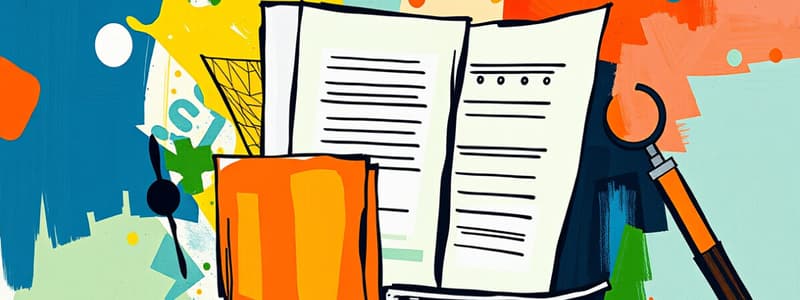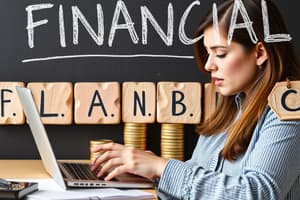Podcast
Questions and Answers
What is the definition of money management?
What is the definition of money management?
Planning how to get the most from your money
Identify three examples of personal financial documents.
Identify three examples of personal financial documents.
Birth certificate, social security card, receipts, bank statements, tax forms
List three ways that organizing financial documents can help you.
List three ways that organizing financial documents can help you.
Plan and measure your financial progress, handle routine money matters, determine how much money you will have now and in the future
Where are three places to keep or store financial documents?
Where are three places to keep or store financial documents?
What's the definition of a safe-deposit box?
What's the definition of a safe-deposit box?
What is an example of something you would put in a safe-deposit box?
What is an example of something you would put in a safe-deposit box?
What is an example of something you would NOT put in a safe-deposit box?
What is an example of something you would NOT put in a safe-deposit box?
What is the definition of a personal balance sheet?
What is the definition of a personal balance sheet?
What is the definition of net worth?
What is the definition of net worth?
How do assets differ from liabilities?
How do assets differ from liabilities?
What are the four steps to create a balance sheet?
What are the four steps to create a balance sheet?
What is an example of an asset?
What is an example of an asset?
What are the four categories of wealth?
What are the four categories of wealth?
What is an example of a liability?
What is an example of a liability?
How do real estate and liquid assets differ?
How do real estate and liquid assets differ?
Generally, high net worth is considered a good thing. When though, can high net worth actually be trouble?
Generally, high net worth is considered a good thing. When though, can high net worth actually be trouble?
How can you increase your net worth? Provide 2 of the four!
How can you increase your net worth? Provide 2 of the four!
What kind of assets do people typically set aside for long-term financial needs?
What kind of assets do people typically set aside for long-term financial needs?
Is being insolvent a good thing or a bad thing? Explain why!
Is being insolvent a good thing or a bad thing? Explain why!
What is the definition of cash flow?
What is the definition of cash flow?
What is the definition of discretionary income?
What is the definition of discretionary income?
What is a fixed expense?
What is a fixed expense?
What is a variable expense?
What is a variable expense?
What two things make up outflow?
What two things make up outflow?
What is the difference between a surplus and a deficit?
What is the difference between a surplus and a deficit?
Flashcards are hidden until you start studying
Study Notes
Money Management
- Money management involves planning to maximize financial resources effectively.
Personal Financial Documents
- Essential documents include birth certificates, social security cards, receipts, bank statements, and tax forms.
Organizing Financial Documents
- Helps in planning and measuring financial progress.
- Aids in managing routine financial tasks.
- Assists in projecting current and future financial status.
Storage Options for Financial Documents
- Financial documents can be stored in home files, safe-deposit boxes, or on home computers.
Safe-Deposit Box
- A secure storage unit rented from a bank, typically costing less than $100 yearly.
Suitable Items for Safe-Deposit Boxes
- Ideal for storing valuable collectibles like coins or stamps.
Unsuitable Items for Safe-Deposit Boxes
- Technology items, such as iPads, should not be stored in safe-deposit boxes.
Personal Balance Sheet
- Also known as a net worth statement; lists assets, debts, and calculates net worth.
Net Worth Definition
- Calculated as the difference between total assets (things owned) and total liabilities (amounts owed).
Assets vs. Liabilities
- Assets: Items of value owned by an individual or entity, including cash, properties, and investments.
- Liabilities: Debts and obligations an individual needs to repay.
Steps to Create a Balance Sheet
- Assess your assets.
- Evaluate your liabilities.
- Calculate your net worth.
- Analyze your overall financial situation.
Examples of Assets
- Personal property qualifies as an asset.
Categories of Wealth
- Wealth is categorized into personal possessions, investment assets, liquid assets, and real estate.
Examples of Liabilities
- Current liabilities cover short-term debts payable within one year.
- Long-term liabilities are debts that extend beyond one year.
Real Estate vs. Liquid Assets
- Real estate typically requires more time to liquidate for cash than liquid assets, which can be quickly converted.
High Net Worth Considerations
- High net worth can be problematic if all funds are invested in a single venture with high risk, especially if lacking liquidity for expenses.
Increasing Net Worth
- Net worth can be improved by increasing savings and growing investments.
Long-Term Financial Needs
- Individuals often set aside real estate and its market value for long-term financial needs.
Insolvency Definition
- Being unable to meet debt obligations indicates insolvency, reflecting financial distress.
Cash Flow Definition
- Cash flow refers to the actual movement of money into and out of personal accounts.
Discretionary Income Definition
- The income remaining after essential expenses such as food, shelter, and transportation.
Fixed Expenses Definition
- Fixed expenses are consistent monthly costs that are not easily altered and typically recur regularly.
Variable Expenses Definition
- Variable expenses fluctuate month-to-month, affecting overall cash flow.
Cash Outflow Components
- Cash outflow comprises fixed and variable expenses combined.
Surplus vs. Deficit
- Surplus: Excess money available for saving or spending.
- Deficit: Occurs when expenses exceed income, indicating financial strain.
Studying That Suits You
Use AI to generate personalized quizzes and flashcards to suit your learning preferences.




